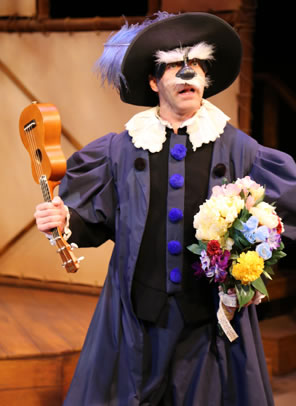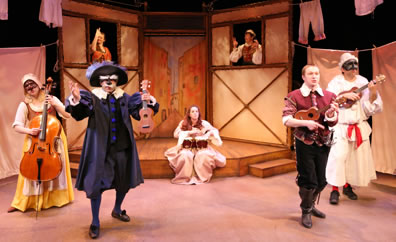The Lady Becomes Him
Indescribable
By Faction of Fools, based on the 17th century scenario Donna Zanni
Faction of Fools Theatre Company, Gallaudet University's Eastman Studio Theatre–Elstad Annex, Washington, D.C.
Friday, May 3, 2013, general admission: center stands in studio theater
Directed by Toby Mulford

Il Dottore (Matthew Pauli) holds two weapons in the Faction of Fools' production of The Lady Becomes Him. Photo by Second Glance Photography, Faction of Fools.
So, how do I write up this one? Reviewing commedia dell'arte is like trying to describe a "you had to be there" moment, like Monty Python or Coneheads. I mean, try telling people unfamiliar with Monty Python and the Holy Grail about the vicious bunny rabbit ("Look at the bones!") or the Knights Who Say Ni and watch their gaze turn to glaze. The Coneheads are funny because they have cone heads, and what they actually say matters only in that context—or not. Sometimes it matters not at all but that a Conehead says it and therefore it is funny.
That is commedia dell'arte when done well. Faction of Fools is master of this art form, and its members continue to do it well with their latest offering, The Lady Becomes Him.
Ooh, "art form." Yes, I could go all academic here because commedia dell'arte is classical theater that not only way predates Coneheads, Monty Python, Loony Tunes, and even Shakespeare but also shares (perhaps originated) many of the conventions of improvisatory theater, sketch comedy, cartoons, and Elizabethan theater. While it may not have directly influenced John Belushi, John Cleese, and Bugs Bunny, commedia dell'arte did directly influence William Shakespeare, many scholars believe (as does this nonscholar). So, if you are one who embraces the theatrical arts in general or you are a Shakespearean in particular, attending The Lady Becomes Him can serve as a suitable educational enterprise. Kind of.
Oh, never mind. It's funny. You laugh. A lot. You also cringe at times: The puns just get too awful and the running jokes run dry after two too many repetitions. The characters are broader than a barn bearing "See Rock City." And the script is—well, what script? The Lady Becomes Him is "a Frankenstein monster of a play," writes Toby Mulford in his director's notes. The skeleton, as he calls it, is a three-page scenario titled Donna Zanni, one of the few plot outlines extant from 17th century Italy, where commedia dell'arte first developed in the 16th century. Out of that outline, this ensemble put together the play (which has been the practice of commedia delle'arte for some 500 years).
Here's the scenario. Orazio is in love with Celia who is married to Il Dottore, a wealthy merchant, while Isabella is in love with Orazio. Meanwhile, Luzio is in love with Isabella. Another love triangle has developed among the servants: Coviello (Orazio's servant), Pulcinella (Il Dottore's servant), and Rosetta (Isabella's servant). Coviello (played by comic musician Jesse Terrill) comes up with a scheme to hook up Orazio with Celia while freeing Rosetta from the clutches of Pulcinella: Coviello conjures a Sorcerer and a Spirit who provide rings that turn Celia into Pulcinella and Pulcinella into Celia. Thus, the lady becomes him and vice versa.
All actors except the young lovers wear masks (leaving only the mouth visible) and stock-character costumes. All act with exaggerated gestures and perform hyperviolence and silly pratfalls (like cartoons). They also engage directly with the audience and then have to react to the audience response (as does improv). John V. Bellomo as Pulcinella, a cook, describes how he prepares vegetables in a certain way for his love, and forgetting the word for that style of cutting vegetables he seeks help from the audience. "Strips," my wife said. "That's a very technical term, but not the one I'm thinking of," Bellomo replied. He further describes slicing vegetables in slivers, until I said "Julienne." "Who's Julienne? My love is Rosetta, and here she comes now." Ba-da-groan. Well, you had to be there.
The set, designed by Daniel Flint, is cartoon-simplicity, with a two-tiered stage, canvas walls on either side of the center, windows in each wall for Il Dottore's house on one side and Isabella's house on the other, and clothes hanging on lines above and to the side of the stage. A closed-captioned board is integrated into the set above the door, and it provides the preshow speech (about no photography and turning off cell phones and where the emergency exits are located and how the usher will help, whereupon it tells the usher to wave) concluding with a warning that if the board goes blank it is because the characters have gone off script. That happens a lot, by the way.
The closed-caption board becomes a character in the play. Faction of Fools is based at Gallaudet University in Washington, D.C., a college for the deaf and hard of hearing. Two deaf students are in the cast, Amelia Hensley playing Isabella and the Sorcerer, and James McGowan playing Luzio. The fact that they are deaf and use American Sign Language is integrated into the play. Butterflies are the leitmotif of this estranged couple, and when their butterflies unite at the end, it's a beautiful thing. But along the way, as Isabella pines for Orazio instead of Luzio, miscommunication becomes one of the recurring jokes. When Il Dottore (Matthew Pauli) discovers the closed-caption board for the first time ("Look, it even writes what I say!"), he uses it to help explain who's who to Isabella; but, of course, even though he's speaking English he doesn't make himself clear, and when he tries to use the board again, it goes on strike in protest. Yeah, you had to be there.
Not only does commedia dell'arte have no fourth wall, the characters are fully aware that they are in a play—like Il Dottore discovering that a bench, used for several stunts, is nailed to the stage floor ("Who nails a bench to the stage floor?" he asks rhetorically). When a character needs to dispense with a prop, a hand sticks out from the door to take it. Rosetta (Rachel Spicknall Mulford, who also plays a delightfully dizzy Spirit), brings in a basket of laundry and a piece of wicker breaks off, prompting Pulcinella (or Bellomo—they are one and the same here) to riff on how she should take better care of the props. The closed-caption board goes blank.
The scripted stuff is no less silly. Mulford's Rosetta and Bellomo's Pulcinella take off on tangents of sexual paroxysms every time somebody mentions some sort of food. Il Dottore is ever getting tangled up in a bedsheet hanging on the clotheslines ("Who hangs their clothes at the door?" he asks rhetorically). Then in a set piece with the characters playing other characters in a futile attempt to communicate better ("You be him, I'll be her, and she'll be you"), Hensley's Isabella pretending to be Il Dottore gets tangled up in the bedsheet, too. You also get lots of tumbling about, knocks on the head, and punching, including a rapid-fire slapping sequence going back and forth along a line of four characters. It's stupid, it's funny, and it's an amazing feat of timing even if two of the four, Isabella and Luzio, weren't deaf and could hear the sound effects cues.
It is not all simply clowning around—though, in fact, the traditional character of Pulcinella is the Adam of all circus clowns. Amid all the shenanigans is some superb acting, and Lindsey D. Snyder turns in a true tour de force performance as Celia. She's overly sweet, overly innocent, overly feminine as commedia convention requires in her role as Il Dottore's wife. But when she puts the magical ring on her finger and turns into Pulcinella, Snyder convincingly becomes Bellomo's Pulcinella in voice, manner, and strut, even though physically we see the well-dressed woman (except for one sequence when she is Pulcinella and he is himself and they, dressed alike, appear on stage together, doing that obligatory mirroring sketch made funnier by some two feet difference in their heights). I'll go ahead and say Bellomo is not quite so adept as Celia as Snyder is as Pulcinella, but the big, bulky Bellomo pretending to be a woman while Orazio (played with effervescent innocence by Stephen Hock) courts him, er her, is funny stuff. OK, you had to be there.

The cast perform the semi-finale of The Lady Becomes Him. In front, from left, are Rosetta (Rachel Spicknall Mulford), Il Dottore (Matthew Pauli), Celia (Lindsey D. Snyder, sitting), Orazio (Stephen Hock), and Pulcinella (John V. Bellomo); in back, from left, are Isabella (Amelia Hensley), the closed-captioned board (closed-captioned board), and Luzio (James McGowan). Photo by Second Glance Photography, Faction of Fools.
Nor is commedia dell'arte all comedy. After all, my first experience with Faction of Fools was seeing its Commedia Romeo and Juliet, a hilarious tragedy. Because of all the slapstick, the sudden insertion of a truly serious emotion strikes our heart with the force of Cupid's arrow shot from a crossbow. At the climactic moment of The Lady Becomes Him, Celia confesses to her over-protective husband that she's in love with Orazio. "Does he make you happy?" Il Dottore demands angrily. "Yes," she bravely replies. After a moment's pause, he says, "Then I release you," a line Pauli speaks so tenderly, it stops us breathing. "I only wanted you to be happy," he says. After all the zaniness we've been through, and probably because of all the zaniness we've witnessed, this moment is one of the most heartfelt presentations of unconditional love I've ever seen performed on stage.
This being commedia dell'arte, though, the moment must then, in turn, become the butt of a joke. What follows is what we think is the play's benedictory closing line from Il Dottore but is actually the first line of an extraordinarily long-winded speech about unconditional love while the other actors try to shut him up so they can take their bows (the closed-captioned board, meanwhile, works overtime unspooling his rant). Finally, the stage manager (Kathryn Dooley) tries knocking the set over on Pauli, but he's standing just where the open window lands, leaving him unscathed. So on and on he goes. It takes cutting the lights completely to shut him up.
Well, I guess you had to be there. I'm certainly glad we were.
Eric Minton
May 7, 2013
Comment: e-mail editorial@shakespeareances.com
Start a discussion in the Bardroom



 Find additional Shakespeareances
Find additional Shakespeareances